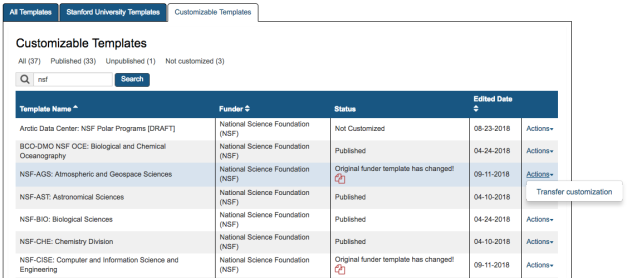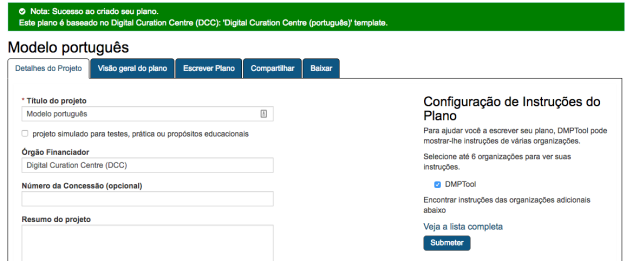In the waning weeks of summer, we accomplished a wide range of DMPTool things. A bulleted summary of mostly template-related updates is below. Admins should take note that the minor National Science Foundation (NSF) template updates resulted in new versions of the 4 templates in question. This means that admins will need to transfer any customizations you may have created for these templates (instructions here). All users will also see a dismissable notification message when you log into the tool (screenshot below). Read on for more details.
TL;DR
- Some minor NSF template updates: AGS, EAR, CISE, SBE
- DCC template now available in Brazilian Portuguese
- DMPTool templates added to protocols.io
- Final promo materials shipped and order form closed
- First successful eduGAIN configuration: welcome to Australian National University!


Minor NSF template updates
While working on our machine-actionable DMPs grant, we noticed that a handful of NSF entities had issued updates to DMP requirements since our comprehensive template audit in Feb 2018. The four divisions/directorates listed below posted new documents in Apr 2018 with very minor changes from the previous versions. None of the changes affect the core requirements; most involve updated links and resources. A detailed summary of the changes for each template follows and you can view all templates on the DMPTool Funder Requirements page:
NSF-AGS: Atmospheric and Geospace Sciences
- very minor text changes for questions 2 and 3
- new section with link to fillable document from NOAA for researchers from paleoclimate community: www.ncdc.noaa.gov/data-access/paleoclimatology-data/contributing
- still provide their own PDF fillable form for NSF-AGS DMPs; no updates to this form
NSF-EAR: Earth Sciences
- updated PDF document with new links
- updated appendix with list of recommended repositories and other resources
NSF-CISE: Computer & Information Science & Engineering
- updated links and reformatting on webpage
- merged redundant questions about data storage reducing total questions from 7 to 6
NSF-SBE: Social, Behavioral & Economic Sciences
- new PDF document with no substantive changes; mostly reformatting and removed references to specific repositories
DCC template available in Brazilian Portuguese
A big thanks to Vitor Silvério Rodrigues from São Paulo State University (UNESP) for translating the DCC template (defined by our Digital Curation Centre partners) into Brazilian Portuguese! This is the default, best practices template provided when users check the box to indicate that they aren’t applying to a specific funder. Anyone can now download the translated template from the Funder Requirements page. The DMPTool is not localized to automatically serve up the translated template for users who set their language to Brazilian Portuguese, however. In order to create a new plan with the translated version, users should make the following selections in the create plan wizard (regardless of language setting):
- Enter a project title
- Select São Paulo State University (UNESP) as your organization
- Select Digital Curation Centre (DCC) as the “funder”
- Click button to create plan


DMPTool templates added to protocols.io
Protocols.io is an open repository popular among computational and bioinformatics researchers, yet open to all domains, where all scientific protocols (private or public) can be annotated and discussed on step- or protocol-level. Users can also fork (clone) public protocols and publish modified versions as well as connect protocols to published articles and other research outputs, all in the pursuit of increasing transparency and reproducibility.
Scientific protocols are among the many research outputs that we aim to inventory with machine-actionable DMPs. We often promote the notion that DMPs themselves are essentially protocols (i.e., a description of digital research methods), and should be maintained as such over the course of a project. During conversations with the protocols.io team about our intersecting activities, they suggested that we experiment with enabling researchers to create and maintain DMPs on their platform. So we created a Data Management Plans group with two basic DMP templates for users who might prefer this dynamic platform for documenting their digital protocols to an online wizard that produces a static text file. Go check it out and spread the word!
Final promo materials shipped and order form closed
Everyone who placed orders for DMPTool marketing materials (postcards and stickers) should have received them by now, hopefully in time for workshops and other events to kick off the new academic year. The order form for free materials associated with the launch is now closed. Just a reminder that we provide various promo materials (all CC0) on the website so anyone can produce their own swag and spread the DMPTool gospel.
First successful eduGAIN/SSO configuration!
One of the most popular features of the DMPTool is the ability for participating institutions to configure Shibboleth single signon, thereby enabling their users to sign in easily with institutional credentials. Until recently, we only provided this functionality for members of the US-based InCommon federation. There is now an interfederation service called eduGAIN that connects identity federations around the world. We are pleasantly surprised (since Shib can be a tricky, black-box affair) that we were able to configure our first eduGAIN institution: the Australian National University. We hope for (but cannot promise) similar success stories for other identity federations that participate in eduGAIN. The Australian Access Federation is documenting the process and we’re delighted to welcome ANU to the DMPTool community!

You must be logged in to post a comment.